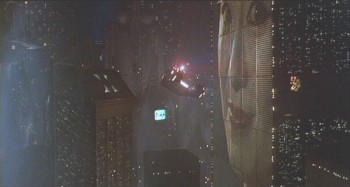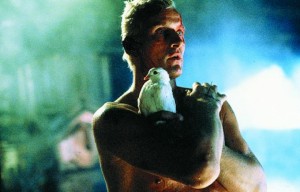|
Since the genre began, science fiction has aspired to tackle the burning question of "what it means to be like the Hu-Man," usually with as much intellectual subtlety as the helmeted space ape that voiced the above quote. But occasionally, we get lucky, and I mean that in the sense that we sometimes get a good film and not in the sense that Natalie Portman drops by to use the telephone and decides to stay the night, because she's mine and you can't have her.  Blade Runner is ostensibly about a futuristic detective tracking down runaway androids (who may or may not dream of electric sheep,) but the general plot almost pales in comparison to the film's understated ruminations on self-awareness and reality, and the fact that the two may not necessarily be compatible. Perception is key here, a point made throughout by the continual references to eyes, both in dialogue and in just plain showing honking huge peepers staring right at you. This is certainly one of the most subtle filmic examinations of self-awareness and the import we put on memory I've seen, while simultaneously containing beautifully succinct bits of conversation, such as: Tyrell: "What seems to be the problem?" Roy: "Death."-which pretty much sums up the human condition in a nutshell. For all of its incredible and incredibly mimicked visuals, Blade Runner is about being human-even if you aren't human-not about how cool future gadgetry will be able to solve everything with a simple reconfiguring of the phase flux modulation inverter a la every new Star Trek series. This is everything The Matrix should've been but sadly wasn't. The 1992 "Director's Cut" version restored some of the more subtle points that had been lost in the compromised theatrical release, including a great deal more ambiguity about reality. The happy ending got shown the door, as did Deckard's internal monologue, which Harrison Ford claimed to have performed so laconically in hopes that it would be unusable. The changes, while small, served the overall story in great quantities; a film which at its heart is about uncertainty doesn't benefit from a clean and proper "well, that all worked out peachy" conclusion, and the narration doesn't actually clarify anything, so it's quite an improvement to see both of them gone in favor of inserting a brief daydream of a galloping unicorn, which says more by intimation that all the narration in the world.  Some critics and viewers have felt that this film is too aloof and estranged to connect with, a veritable emotional vacuum. To some extent, this is certainly true; whether or not it puts you off is up to the individual's tastes. However, it is not this way due to lack of care in its creation. What we see is a world where space travel has become possible, robots are advanced to a degree that they are virtually indistinguishable from man, cars fly, and umbrellas light our way at night, none of which has made people any less hung-up, or racist, or able to communicate meaningfully with one another. Our detective Deckard isn't a particularly bad guy, but he's not especially nice either, and despite being able to discern the minute psychological differences between the reactions of an android and a human, his attempts to reach out to his would-be quarry Rachel are confused and clumsy, as if something so apparently integral to being human is still too elusive for him to grasp. The "more human than human" replicants, on the contrary, show emotion constantly, almost at random, but with little personal doubt. In the end, their wants are really no different from our own, with the dying Roy's last-minute attempt to connect with Deckard, running through his memories and lamenting that "all these moments will be lost in time" feeling like an entirely familiar grievance. Is that which is virtually identical to human any less than actually human? The film throws the beginnings of doubt into Deckard's mind, and leaves him-and us-to consider them without any ponderous homilies on what conclusions we were supposed to draw. If only more films could follow that example. Unless the movie is rated "G," it need not be aimed at the intellectually five-to-seven-years-olds. -review by Matt Murray
|
|
||||||||